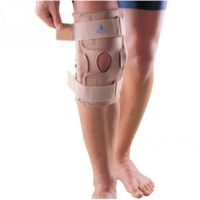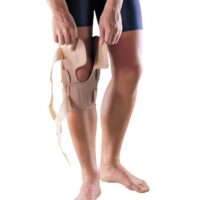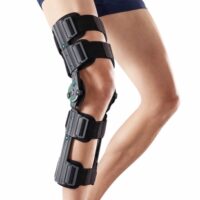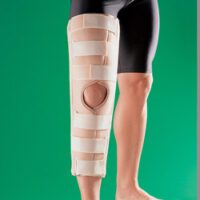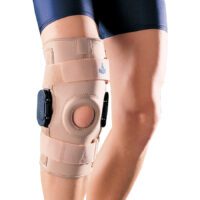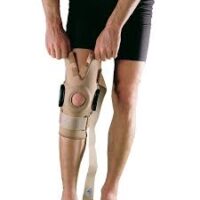
ACL Treatment
Introduction to ACL Treatment Options
The Anterior Cruciate Ligament (ACL) plays a vital role in stabilising the knee, collaborating with muscles, other ligaments, and joint receptors. Suffering an ACL injury often raises questions about the most effective treatment path.

Can an ACL Heal without Surgery?
Traditionally, it was always thought that an ACL cannot heal on its own in the traditional sense because it lacks blood supply, which is crucial for the healing process of most tissues in the body. While this is certainly the case for the majority of torn ACLs, there is now some research evidence that some ACLs will repair themselves if the two ends of the torn ACL are kept close to each other for a a few months post-injury.
Recent research has identified that some ACL injuries will repair when the two ends of the torn ligament can be kept within a few millimetres of each other. That is exactly why a range restriction brace is required. The Cross Brace Technique (CBT) is pioneering and in early stages of research, so stay tuned for future developments in non-surgical treatment options.
What is the Best ACL Treatment?
The best treatment for an ACL injury depends on several factors, including the severity of the injury, the individual’s activity level, age, overall health, and personal goals. Treatments range from non-surgical rehabilitation to surgical reconstruction of the ligament.
Here’s an overview of the most commonly recommended treatments:
- Early Surgical Reconstruction involves prompt surgical intervention soon after the injury, preferred by athletes aiming for a quick return to their sport.
- Delayed Surgical Reconstruction suggests waiting for at least three months of rehabilitation before considering surgery. Research shows this may improve long-term outcomes for those who are recreationally active.
- Non-Surgical Management offers a rehabilitation-focused approach, ideal for individuals based on their activity level and personal goals.
- ACL Cross Brace Option introduces a non-invasive support method during rehabilitation.
Research Insights for ACL Treatment
Studies, including those by Dr Adam Culvenor and colleagues, highlight that early surgery could accelerate kneecap cartilage loss, increasing the risk of arthritis in young adults.
Conversely, non-surgical management might equally preserve knee health and functionality, especially for non-athletes.
Culvenor AG, Patterson BE, Guermazi A, Morris HG, Whitehead TS, Crossley KM. Accelerated Return to Sport After Anterior Cruciate Ligament Reconstruction and Early Knee Osteoarthritis Features at 1 Year: An Exploratory Study. PM R. 2018 Apr;10(4):349-356. doi: 10.1016/j.pmrj.2017.09.005. Epub 2017 Sep 14. PMID: 28919498.
Factors Influencing Your Decision
The choice between surgery and rehabilitation hinges on age, activity level, knee stability, additional injuries, and personal ambitions. Younger, active individuals, particularly those engaged in high-impact sports, may benefit more from surgical options.
The Role of Physiotherapy in ACL Treatment
Physiotherapists are crucial in both pre-surgical preparation and post-injury recovery. At PhysioWorks, we tailor programs to your needs, ensuring progress through regular evaluations and specialist collaboration.
What’s New in ACL Treatment Research?
Ongoing research challenges old beliefs, promoting personalised treatment plans over a general approach. This shift underlines the importance of individual assessment in determining the best treatment strategy.
Long-term Considerations
Choosing non-surgical treatment requires careful consideration of future activity levels and the potential risk of further injury to the knee. In some cases, opting for non-surgical treatments initially does not preclude surgery in the future if the knee remains unstable or if the individual’s activity demands change.
What to Do? Seeking Professional Advice
Facing the decision between surgery or rehabilitation for an ACL injury warrants professional advice. Consulting with a physiotherapist and orthopaedic knee surgeon is crucial, as they can offer insights tailored to your situation and the latest findings.
Conclusion
Deciding on ACL surgery versus rehabilitation requires careful consideration of numerous factors, including recent studies, personal objectives, and professional guidance.
Rochedale - Call 38410277
Book Online: RochedaleSalisbury - Call 32751044
Book Online: SalisburySandgate - Call 32691122
Book Online: SandgateACL FAQs
- Can an ACL heal without surgery?
- Yes, some ACL injuries can heal without surgery if the torn ends are kept close together with a brace.
- What is the best treatment for an ACL injury?
- The best treatment varies and can include non-surgical rehabilitation or surgical reconstruction based on severity and personal factors, such as concomitant injuries eg multiple ligament ruptures or meniscal tears, plus your desired return to sport level. It critical to discuss your specific case with your knee surgeon or physiotherapist.
- How long is the recovery time for ACL surgery?
- Recovery time can range from six months to a year, depending on rehabilitation and individual progress. Function and strength is the most important component, so we recommend aiming at a 12 months window that included continuously upgraded rehabilitation under the guidance of your ACL physiotherapist.
- What are the risks of not getting ACL surgery?
- Not getting surgery can lead to knee instability and potential further injury, but rehabilitation can manage these risks for some individuals. Yes. But there are many factors at play. we highly recommend individual advice from your knee physiotherapist or surgeon.
- What does ACL rehabilitation involve?
- ACL rehabilitation involves physiotherapy, exercises to strengthen the knee, and balance, plyometric and sport-specific agility exercises appropriate to your control and goals.
- Is it possible to return to sports after an ACL injury?
- Yes, many athletes return to sports after ACL rehabilitation or surgery, though it requires a carefully managed recovery plan. Please be guided by your trusted ACL physiotherapist and knee specialist.
Related Articles
Explore these resources for more detailed information:
- ACL Injuries: This comprehensive guide covers the nature of ACL injuries, treatment options, and the critical role of rehabilitation, emphasising the latest research and physiotherapist insights. It’s a go-to resource for understanding ACL injuries from a professional perspective.
- ACL Injury Prevention: Highlights the importance of education and ACL injury prevention training. It notes a significant risk reduction in ACL injuries through specific training programs, particularly mentioning a study that showed a 52% risk reduction for females participating in an ACL injury prevention program.
- ACL Injury FAQs: Offers straightforward answers to common questions about ACL injuries, including symptoms, treatment options, recovery processes, and the consequences of not undergoing surgery. It emphasizes the need for professional advice for diagnosis and personalised treatment plans.
- What Is The Best Surgery for an ACL Tear?: Explores factors that determine the need for ACL surgery, taking into account the patient’s age, activity level, and expectations.
- Exploring the Potential of ACL Braces as a Treatment Option: Looks at how ACL braces can be part of a comprehensive treatment approach, including physiotherapy and surgical intervention.
- What If You Don’t Get ACL Surgery?: Discusses the non-surgical ACL approach and the importance of a rehabilitation program guided by a sports physiotherapist.
- Knee Pain: Causes, Relief, Physio & Prevention: Provides a broad overview of knee pain causes, including ACL injuries, and offers guidance on relief and prevention.
- Knee Ligament Injury – Physiotherapist Guide & Tips: Offers insights into knee pain, covering diagnosis, ligament issues, ACL injuries, meniscal injuries, and pain relief methods through exercise and treatment.
- Ligament Tear: Discusses various ligament injuries including ACL, PCL, MCL, and LCL sprains, and provides information on prevention, early detection, and effective treatment.
- Posterolateral Corner Injury Treatment & Recovery – Offers insights into knee pain, covering diagnosis, ligament issues, ACL injuries, meniscal injuries, and age and arthritis concerns. Learn about knee instability management.






